-
 Bitcoin
Bitcoin $83,880.0364
2.80% -
 Ethereum
Ethereum $1,808.9871
2.05% -
 Tether USDt
Tether USDt $0.9996
-0.02% -
 XRP
XRP $2.1254
5.18% -
 BNB
BNB $597.0415
1.77% -
 Solana
Solana $121.8511
6.23% -
 USDC
USDC $0.9999
-0.02% -
 Dogecoin
Dogecoin $0.1711
8.55% -
 Cardano
Cardano $0.6607
4.73% -
 TRON
TRON $0.2400
1.83% -
 UNUS SED LEO
UNUS SED LEO $9.4688
0.77% -
 Chainlink
Chainlink $12.9117
3.28% -
 Toncoin
Toncoin $3.3769
-5.92% -
 Stellar
Stellar $0.2595
1.51% -
 Avalanche
Avalanche $18.0323
0.37% -
 Sui
Sui $2.2780
2.94% -
 Shiba Inu
Shiba Inu $0.0...01226
1.24% -
 Hedera
Hedera $0.1649
3.59% -
 Litecoin
Litecoin $84.3834
3.43% -
 Polkadot
Polkadot $4.0619
1.74% -
 MANTRA
MANTRA $6.2855
-1.22% -
 Bitcoin Cash
Bitcoin Cash $299.4248
1.74% -
 Bitget Token
Bitget Token $4.5468
1.98% -
 Dai
Dai $0.9999
-0.01% -
 Ethena USDe
Ethena USDe $0.9992
-0.02% -
 Monero
Monero $215.2689
2.79% -
 Hyperliquid
Hyperliquid $11.8405
4.32% -
 Uniswap
Uniswap $5.8764
3.23% -
 Pi
Pi $0.5380
-5.19% -
 Pepe
Pepe $0.0...07139
9.88%
Can Bitcoin ETFs lower the investment threshold?
Bitcoin ETFs offer easier access to Bitcoin than direct purchase, lowering the investment threshold despite brokerage fees and regulatory hurdles. However, volatility and other risks remain.
Feb 27, 2025 at 04:48 am
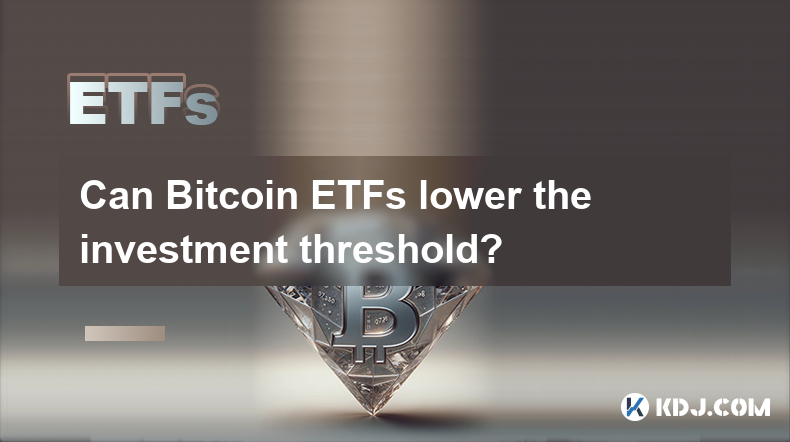
Can Bitcoin ETFs Lower the Investment Threshold?
Key Points:
- Direct Exposure vs. Indirect Exposure: Bitcoin ETFs offer indirect exposure to Bitcoin, contrasting with directly purchasing Bitcoin through exchanges. This distinction impacts the investment threshold and accessibility.
- Regulatory Hurdles and Accessibility: The approval process for Bitcoin ETFs varies significantly across jurisdictions, directly impacting their availability and thus the investment threshold. Stringent regulations can limit access, maintaining a higher barrier to entry.
- Brokerage Fees and Minimum Investments: While ETFs generally have lower minimum investment requirements than directly buying Bitcoin, brokerage fees and platform minimums can still create barriers for small investors.
- Liquidity and Trading Costs: The liquidity of a Bitcoin ETF impacts its price stability and trading costs. Higher liquidity generally translates to lower trading costs, making it more accessible for smaller investments.
- Diversification and Portfolio Management: Bitcoin ETFs allow for diversification within a broader investment portfolio, making it easier to manage risk and potentially lower the perceived investment threshold for risk-averse investors.
Detailed Exploration of How Bitcoin ETFs May Lower the Investment Threshold:
- Direct Bitcoin Purchase vs. ETF Investment: Purchasing Bitcoin directly involves navigating cryptocurrency exchanges. This requires creating an account, undergoing Know Your Customer (KYC) and Anti-Money Laundering (AML) checks, securing a digital wallet, and understanding the risks associated with self-custody. The minimum purchase amount on most exchanges varies, but it's often a fraction of a Bitcoin, representing a significant financial commitment for many. Furthermore, the technical aspects of managing a digital wallet, including security protocols, can be daunting for novice investors. In contrast, investing in a Bitcoin ETF is significantly simpler. Investors can buy shares of the ETF through their existing brokerage accounts, bypassing the complexities of cryptocurrency exchanges and self-custody. This accessibility alone significantly lowers the practical investment threshold for many individuals. The ease of use and familiarity associated with traditional brokerage accounts make Bitcoin ETFs a more comfortable entry point for those intimidated by the technicalities of direct Bitcoin ownership. However, it's crucial to understand that the ETF still carries inherent risks associated with the underlying Bitcoin price volatility.
- Regulatory Landscape and ETF Approval: The regulatory approval process for Bitcoin ETFs varies greatly across different jurisdictions. In some countries, regulatory bodies have yet to approve any Bitcoin ETFs, effectively preventing access for investors in those regions. Even in countries where Bitcoin ETFs are approved, the regulatory framework can influence the structure and accessibility of the ETFs. For instance, stringent requirements for custody and oversight can increase the operational costs of the ETF, potentially leading to higher expense ratios and impacting the attractiveness of the investment for smaller investors. Conversely, a more lenient regulatory environment can encourage the creation of more competitive ETFs with lower fees, making them more accessible. Therefore, the regulatory landscape plays a crucial role in determining the overall investment threshold for Bitcoin ETFs. The lack of regulatory clarity or overly restrictive regulations in certain markets can create a significant barrier to entry, limiting the potential for broader participation. Conversely, clear and supportive regulations can pave the way for more accessible and affordable Bitcoin ETF options.
- Brokerage Fees and Minimum Investment Requirements: While ETFs generally have lower minimum investment requirements compared to directly purchasing Bitcoin, it's crucial to consider brokerage fees. Many brokerage platforms have minimum investment amounts for individual trades, which can vary significantly depending on the platform and the type of account. Even if the ETF itself has a low minimum investment per share, the brokerage fees associated with each transaction can disproportionately impact smaller investors. These fees can eat into profits, especially for frequent trading or smaller investment amounts. Therefore, while ETFs offer a more accessible entry point than direct Bitcoin purchases, the overall investment threshold is also influenced by the brokerage fees and minimum investment requirements imposed by the chosen platform. Investors need to compare different brokerage platforms and their fee structures to find the most cost-effective option for their investment strategy.
- Liquidity and Trading Costs: The liquidity of a Bitcoin ETF is directly related to its trading costs. A highly liquid ETF will have tighter bid-ask spreads and lower transaction costs, making it more accessible for smaller investments. Conversely, an illiquid ETF will have wider spreads and higher trading costs, potentially deterring smaller investors who may find the costs disproportionately high relative to their investment size. The level of liquidity is also influenced by factors such as the ETF's trading volume, the size of the underlying Bitcoin market, and the overall market sentiment towards Bitcoin. A larger, more established ETF with high trading volume will generally exhibit greater liquidity, leading to lower trading costs and increased accessibility for smaller investors. Conversely, newer or less popular ETFs might have lower liquidity, resulting in higher transaction costs and potentially making them less attractive for smaller investment amounts. Therefore, understanding the liquidity characteristics of a Bitcoin ETF is crucial for assessing its accessibility for investors with varying capital levels.
- Diversification and Portfolio Management: Bitcoin ETFs offer a degree of diversification within a broader investment portfolio. This is particularly significant for investors who might be hesitant to invest directly in Bitcoin due to its high volatility. By including a Bitcoin ETF as a small component of a diversified portfolio, investors can gain exposure to Bitcoin's potential upside while mitigating the overall portfolio risk. This approach can lower the perceived investment threshold for risk-averse investors who might otherwise avoid direct Bitcoin investments altogether. The ability to integrate Bitcoin exposure into a broader investment strategy through an ETF simplifies portfolio management and reduces the complexity associated with managing a cryptocurrency portfolio separately. This simplified approach can make Bitcoin investment more approachable for individuals with limited experience in managing digital assets. The ease of managing Bitcoin exposure within a diversified portfolio, facilitated by ETFs, significantly contributes to lowering the effective investment threshold for a wider range of investors.
FAQs:
Q: What are the risks associated with investing in Bitcoin ETFs?
A: While Bitcoin ETFs offer a more accessible way to invest in Bitcoin, they still carry significant risks. These include the volatility of the underlying Bitcoin price, regulatory uncertainty surrounding Bitcoin ETFs, counterparty risk (the risk that the ETF issuer might fail), and the potential for market manipulation. It's crucial to thoroughly research and understand these risks before investing.
Q: How do Bitcoin ETFs compare to investing in Bitcoin directly?
A: Investing in Bitcoin directly involves buying and holding Bitcoin on a cryptocurrency exchange, requiring a digital wallet and understanding of cryptocurrency security. Bitcoin ETFs offer indirect exposure through a regulated investment vehicle, simplifying the process but potentially introducing additional fees and counterparty risks. The choice depends on individual risk tolerance, technical expertise, and investment goals.
Q: Are Bitcoin ETFs suitable for all investors?
A: No, Bitcoin ETFs are not suitable for all investors. They are inherently risky investments due to Bitcoin's price volatility. Investors should only invest in Bitcoin ETFs if they understand the risks involved and have a long-term investment horizon. It's advisable to consult with a financial advisor before investing.
Q: What factors influence the price of a Bitcoin ETF?
A: The price of a Bitcoin ETF is primarily determined by the price of Bitcoin itself. However, other factors can also influence the ETF's price, including the ETF's expense ratio, market demand for the ETF, and the overall market sentiment towards Bitcoin.
Q: Where can I invest in Bitcoin ETFs?
A: The availability of Bitcoin ETFs varies depending on your location and the regulatory environment. You can typically invest in Bitcoin ETFs through your existing brokerage account, provided the ETF is available in your region and your brokerage supports its trading. Check with your brokerage for the availability of specific Bitcoin ETFs.
Q: What are the typical fees associated with Bitcoin ETFs?
A: Bitcoin ETFs have various fees, including management fees (expense ratios), brokerage commissions, and potentially other transaction fees. These fees can vary significantly depending on the specific ETF and the brokerage platform used. It's important to compare fees across different ETFs and brokers before investing.
Disclaimer:info@kdj.com
The information provided is not trading advice. kdj.com does not assume any responsibility for any investments made based on the information provided in this article. Cryptocurrencies are highly volatile and it is highly recommended that you invest with caution after thorough research!
If you believe that the content used on this website infringes your copyright, please contact us immediately (info@kdj.com) and we will delete it promptly.
- Justin Sun Accuses First Digital Trust of Insolvency, Triggering Severe Depeg of the FTUSD Stablecoin
- 2025-04-05 03:20:12
- The psychology of betting: how digital assets influence player behavior in 1win
- 2025-04-05 03:20:12
- Remittix Solves Real-World Problems and Provides an Actual Solution to Crypto Payments
- 2025-04-05 03:15:12
- The Crypto Market's 2025 Bull Run Is Here
- 2025-04-05 03:15:12
- If You're Hunting for the Best Meme Coin to Buy, Now's the Time to Look Beyond the Usual Suspects
- 2025-04-05 03:10:13
- PayPal Expands Crypto Services with Solana and Chainlink
- 2025-04-05 03:10:13
Related knowledge
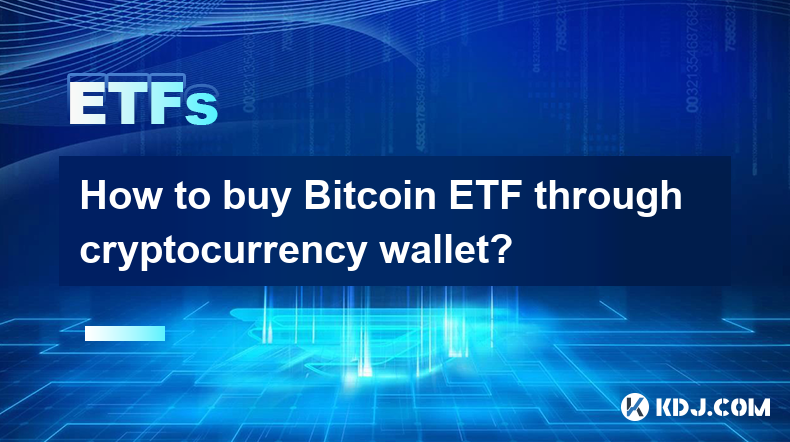
How to buy Bitcoin ETF through cryptocurrency wallet?
Mar 30,2025 at 08:22pm
It's important to understand that you cannot directly buy a Bitcoin ETF through a cryptocurrency wallet. Cryptocurrency wallets are designed to hold and manage digital assets like Bitcoin itself, not exchange-traded funds (ETFs). Bitcoin ETFs are traded on traditional stock exchanges, not decentralized cryptocurrency exchanges. Therefore, the process i...
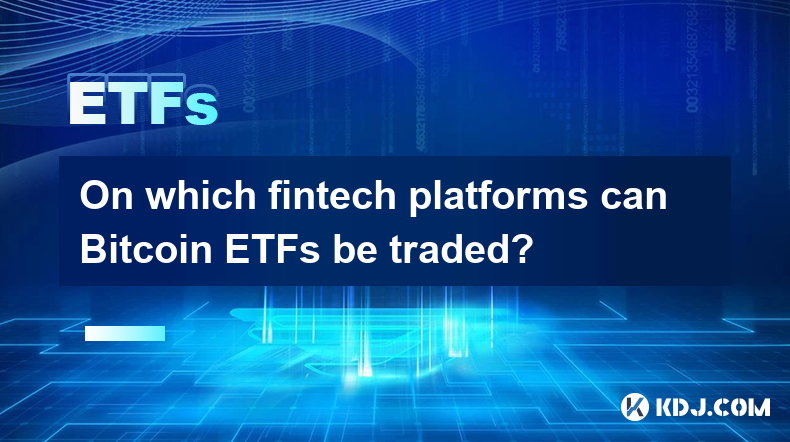
On which fintech platforms can Bitcoin ETFs be traded?
Mar 28,2025 at 09:21am
Navigating the Bitcoin ETF Landscape on Fintech PlatformsThe availability of Bitcoin ETFs on fintech platforms is a rapidly evolving landscape. Currently, the approval and subsequent listing of Bitcoin ETFs are subject to regulatory hurdles and vary significantly by jurisdiction. Therefore, the specific platforms offering Bitcoin ETF trading depend hea...
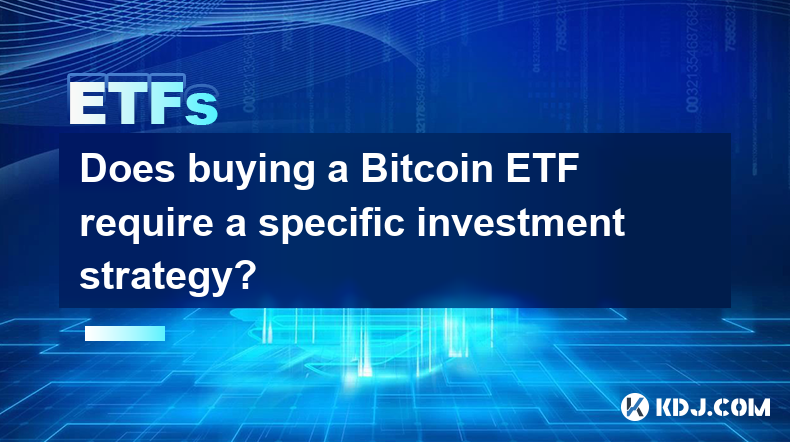
Does buying a Bitcoin ETF require a specific investment strategy?
Mar 27,2025 at 06:36pm
Understanding Bitcoin ETFs and Investment StrategiesA Bitcoin Exchange-Traded Fund (ETF) is a type of investment fund that tracks the price of Bitcoin. Investing in a Bitcoin ETF offers exposure to the cryptocurrency market without the complexities of directly owning and securing Bitcoin. However, like any investment, a successful strategy requires car...
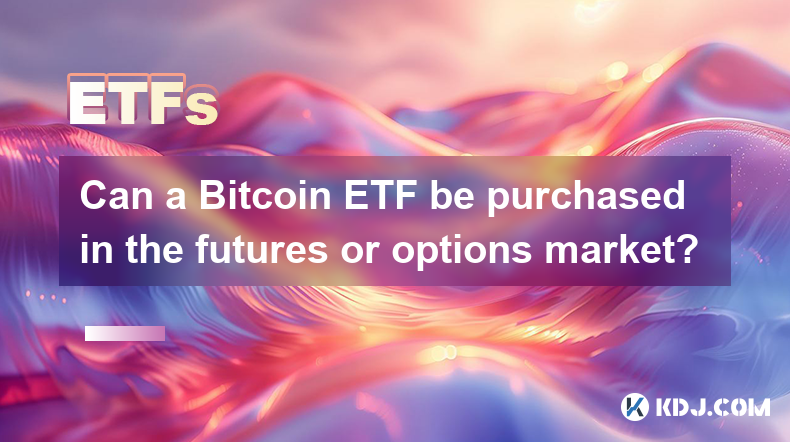
Can a Bitcoin ETF be purchased in the futures or options market?
Mar 27,2025 at 02:49am
Understanding Bitcoin ETFs and Derivative MarketsA Bitcoin ETF (Exchange-Traded Fund) is a fund that tracks the price of Bitcoin. Unlike directly buying Bitcoin, an ETF offers a more regulated and accessible way for investors to gain exposure to the cryptocurrency market through traditional brokerage accounts. However, the availability of a Bitcoin ETF...
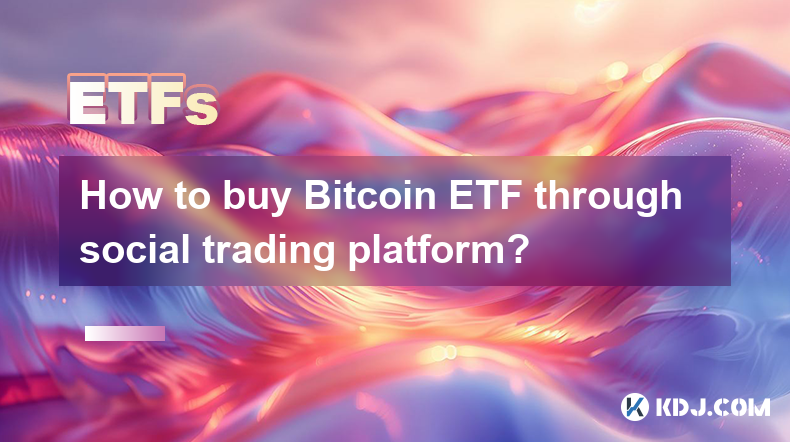
How to buy Bitcoin ETF through social trading platform?
Mar 27,2025 at 10:43am
How to Buy Bitcoin ETF Through Social Trading Platforms? Understanding Bitcoin ETFs and Social TradingA Bitcoin ETF (Exchange-Traded Fund) is a fund that tracks the price of Bitcoin. Unlike directly buying Bitcoin, an ETF offers a regulated and potentially less volatile way to gain exposure to the cryptocurrency market. This is because ETFs are traded o...
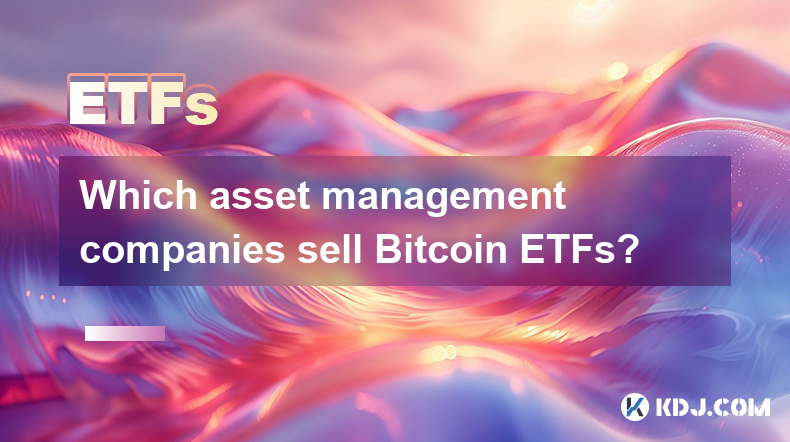
Which asset management companies sell Bitcoin ETFs?
Mar 28,2025 at 02:21am
The Current Landscape of Bitcoin ETF OfferingsCurrently, no asset management company offers a fully-fledged, SEC-approved Bitcoin ETF in the United States. While several companies have filed applications, the Securities and Exchange Commission (SEC) has yet to approve any. This is primarily due to concerns surrounding market manipulation, investor prot...

How to buy Bitcoin ETF through cryptocurrency wallet?
Mar 30,2025 at 08:22pm
It's important to understand that you cannot directly buy a Bitcoin ETF through a cryptocurrency wallet. Cryptocurrency wallets are designed to hold and manage digital assets like Bitcoin itself, not exchange-traded funds (ETFs). Bitcoin ETFs are traded on traditional stock exchanges, not decentralized cryptocurrency exchanges. Therefore, the process i...

On which fintech platforms can Bitcoin ETFs be traded?
Mar 28,2025 at 09:21am
Navigating the Bitcoin ETF Landscape on Fintech PlatformsThe availability of Bitcoin ETFs on fintech platforms is a rapidly evolving landscape. Currently, the approval and subsequent listing of Bitcoin ETFs are subject to regulatory hurdles and vary significantly by jurisdiction. Therefore, the specific platforms offering Bitcoin ETF trading depend hea...

Does buying a Bitcoin ETF require a specific investment strategy?
Mar 27,2025 at 06:36pm
Understanding Bitcoin ETFs and Investment StrategiesA Bitcoin Exchange-Traded Fund (ETF) is a type of investment fund that tracks the price of Bitcoin. Investing in a Bitcoin ETF offers exposure to the cryptocurrency market without the complexities of directly owning and securing Bitcoin. However, like any investment, a successful strategy requires car...

Can a Bitcoin ETF be purchased in the futures or options market?
Mar 27,2025 at 02:49am
Understanding Bitcoin ETFs and Derivative MarketsA Bitcoin ETF (Exchange-Traded Fund) is a fund that tracks the price of Bitcoin. Unlike directly buying Bitcoin, an ETF offers a more regulated and accessible way for investors to gain exposure to the cryptocurrency market through traditional brokerage accounts. However, the availability of a Bitcoin ETF...

How to buy Bitcoin ETF through social trading platform?
Mar 27,2025 at 10:43am
How to Buy Bitcoin ETF Through Social Trading Platforms? Understanding Bitcoin ETFs and Social TradingA Bitcoin ETF (Exchange-Traded Fund) is a fund that tracks the price of Bitcoin. Unlike directly buying Bitcoin, an ETF offers a regulated and potentially less volatile way to gain exposure to the cryptocurrency market. This is because ETFs are traded o...

Which asset management companies sell Bitcoin ETFs?
Mar 28,2025 at 02:21am
The Current Landscape of Bitcoin ETF OfferingsCurrently, no asset management company offers a fully-fledged, SEC-approved Bitcoin ETF in the United States. While several companies have filed applications, the Securities and Exchange Commission (SEC) has yet to approve any. This is primarily due to concerns surrounding market manipulation, investor prot...
See all articles





















































































